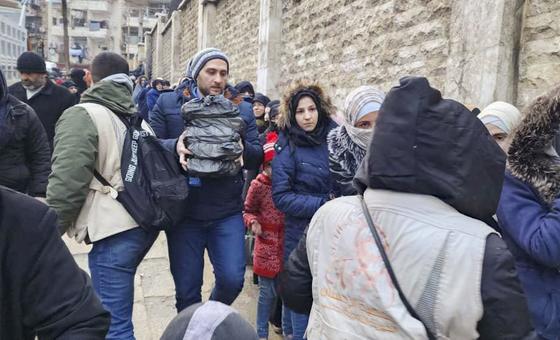“Aid, life-saving aid, is desperately needed by civilians wherever they are irrespective of borders and boundaries,” he told journalists in Geneva. “We need it urgently, through the fastest, most direct, and most effective routes. They need more of absolutely everything.”
According to UN aid coordinating office, OCHA, six trucks carrying “shelter items and non-food item kits, including blankets and hygiene kits” reached Bab al-Hawa on Thursday, the only UN Security Council border crossing authorized for aid delivery.
He urged the response not to be politicized, and for the focus to be on “those who we can still save”.
The Special Envoy’s appeal followed a warning from UN humanitarians on Wednesday that the number of people in need of humanitarian assistance in the country – assessed at a staggering 15.3 million before the earthquake disaster – will have to be revised upwards.
United on humanitarian needs
“We need to do everything to make sure that there are no impediments whatsoever to delay lifesaving support that is needed in Syria,” Mr. Pedersen continued, after chairing a meeting of the Humanitarian Taskforce for Syria which facilitates aid deliveries to the war-torn country. “I was struck by the unity in the meeting we had today by all the different Member States that participated,” he added.
Asked whether it was now time to lift some sanctions on Syria to ensure that aid can reach those in need, the Special Envoy replied that he had discussed this point “in particular with the representatives from the United States and from the European Union and they assured me that they will do whatever they can to make sure that there are no impediments to assistance coming to Syria to help in this operation”.

Food is distributed to people displaced after the earthquake in Aleppo, Syria.
Window of survival
In areas affected by the double earthquake tragedy, rescuers have continued to pull more people alive from the rubble, but the chances of finding trapped survivors are diminishing fast.
The first 72 hours would always be crucial, humanitarians explained, after the initial 7.8 magnitude quake close struck to Gaziantep, Türkiye, early on Monday morning, followed by another 7.5 magnitude earthquake several hours later.
The combined, confirmed, death toll in Syria and Türkiye is now more than 17.000 people. With more victims expected, the UN Syria Envoy asked for “access and resources irrespective of borders and boundaries”.
He added: “The number of casualties continues to rise as we are speaking in both countries and there are still too many people who are under the rubble in the freezing cold. The earthquake struck as the humanitarian crisis in northwest Syria was already worsening, with needs at their highest level since the conflict began.”
War-torn tragedy
Almost 12 years into Syria’s devastating civil war, the country faces massive economic hardship and one of the world’s largest displacement crises. Prior to the earthquake, and based on assessments, the UN calculated that more than four million people in northwest Syria depended on cross-border aid alone.
Syria is divided into areas under the control of the Syrian government, opposition forces and other armed groups. Government and opposition areas have been hit particularly hard by the earthquake.
“We need support to go into the northwest, we need support to go into the government-controlled areas that have been particularly hit, Aleppo and Hama …and we know that some support is already coming in to the airports in Aleppo and also to Damascus,” Mr. Pedersen said.
In all affected parts of Syria, humanitarians have reported an urgent need for logistic, skilled rescue teams and temporary shelters. The UN is helping to mobilize emergency teams and relief operations, and many countries have already offered their support.

